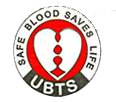
The Uganda Blood Transfusion Service is the National Blood Service responsible for all blood transfusion and safety activities for the entire country. The Uganda Blood Transfusion Service was established as an autonomous institution and commissioned in January 2003 by a Board of Directors. It operates within the framework of the National Health Policy (NHP) and the Health Sector Strategic Plan HSSP).
The Uganda Blood Transfusion Service is a centrally coordinated department in the Ministry of Health with efficient central coordination sufficiently decentralized to render service to all regions of the country. The headquarters at Nakasero Blood Bank acts as a reference centre for the regional blood banks and other public and private hospitals. The blood collection depends on healthy volunteer donors with least risk for Transfusion Transmissible Infections (TTIs).
UBTS has grown from a service supplying blood in Central Uganda within a radius of 100 km from Kampala in 1989 to a network of 7 Regional Blood banks which include Arua, Fort-Portal, Gulu, Kitovu, Mbale, Mbarara and Nakasero; Six- (6) blood collection centers in Hoima, Jinja, Kabale, Rukungiri Lira and Soroti. At that time blood collection was mainly replacement donation and hardly any Voluntary Non-Remunerated Blood Donors (VNRBD). The percentage of VNRBD gradually increased to 85% in 1999 and currently stands at 100%.
The UBTS operates within the framework of the National Health Policy and the Health Sector Strategic plan. The core function of this plan is to ensure that UBTS meets the increased demand for safe blood transfusion especially at Health Centre IVs that are located in rural areas where most of the population lives.
Over the next five years, UBTS will continue providing safe blood and blood components in the areas of Prevention and Treatment of Malaria Anemia, Morbidity and Mortality Reduction, Prevention of HIV/AIDS and other TTIs, Maternal and Child Health and Accidents and emergencies. In order to scale up service delivery in blood transfusion services in the entire country, UBTS will continue to collaborate with key partners like the Uganda Red Cross Society (URCS), Blood donors, users and recipients of blood and other partnerships to delivery blood transfusion services in the entire country.
UBTS has grown from a service supplying blood in central Uganda within a radius of 100kms from Kampala in 1989 to a network of:
Seven Regional Blood banks at Arua, Fort- Portal, Gulu, Kitovu, Mbale, Mbarara and Nakasero.
Six blood collection centers in Hoima, Jinja, Kabale, Rukungiri, Lira and Soroti.
Plans are underway to turn collection centers into blood distribution centers as well.
The World Health Organization (WHO) estimates that 5-10% of incident HIV infections may be attributed to unsafe blood transfusions. To reduce the risk of transfusion-transmitted infections, WHO’s “Aide-Memoire for National programs” encourages developing countries to pursue a strategy that focuses on:
Availability of adequate supplies of blood and blood products form voluntary non-remunerated blood donors and their accessibility to all patients requiring transfusion
Safety of blood and blood products
Safe and appropriate clinical use of blood and blood products
UBTS has developed an improved blood program that has contributed significantly to the prevention and reduction in prevalence of HIV/AIDS. This has been achieved by increased support from the Government of Uganda and the President’s Emergency program for AIDS Relief (PEPFAR).
In support of Millennium Development Goals 2, 4 and 6, the UBTS and URCS have made significant contributions by providing safe blood to:
Reduction of child mortality: 50% of all blood collected is for treating children with severe anemia, largely due to malaria, intestinal worm infection and malnutrition.
Reduction of maternal morbidity and mortality: 25% of the blood is for treatment of pregnant women with anemia and complications of child birth.
25% of the remaining blood is used in other emergence medical treatment of anemia, accident and surgical cases.
Our Vision
An effective, efficient and sustainable Blood Transfusion Service in Uganda
Our Mission
To provide sufficient and efficacious blood and blood components through voluntary donations for appropriate use in health care service delivery.
Our Objectives
The objectives of UBTS have been aligned to the National Health Sector Strategic plan 11 and contribute to the fulfillment of Uganda’s Health Sector goals and the United Nation’s Millennium Development Goals (MDGs).
The objectives are:
To expand blood transfusion Infrastructure to operate adequately within a decentralized healthcare delivery system.
To increase the annual blood collection necessary to meet the transfusion needs for all patients in the country.
To operate an active nationwide quality assurance program that ensures blood safety.
To promote appropriate clinical use of blood.
To strengthen the organizational capacity of UBTS to enable efficient and effective service delivery.
Our Core Values
Proffessionalism, Altruism, Accountable, Excellence
The Profile is managed and Disseminated Worldwide by:
Public Opinions International
Plot 30 Suite 5, Level 4 Green Land Tower
Opposite Bank of Uganda Kampala Road
P.o Box 35297 Kampala-Uganda
Tel: 256 701 992 426
Email:[email protected]
Web: www.pubopinions.org


















